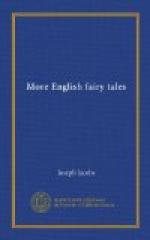“What’s up with thee, fool?” says she.
“Oo, I’ve killed my pig, and lost my mother and I’m nobbut a fool myself,” says he, sobbing.
“That’s bad,” says she; “and haven’t thee anybody to look after thee?”
“No,” says he, “and I canna buy my pottle o’ brains, for there’s nothing I like best left!”
“What art talking about?” says she.
And down she sets by him, and he told her all about the wise woman and the pig, and his mother and the riddles, and that he was alone in the world.
“Well,” says she, “I wouldn’t mind looking after thee myself.”
“Could thee do it?” says he.
“Ou, ay!” says she; “folks say as fools make good husbands, and I reckon I’ll have thee, if thou ’rt willing.”
“Can’st cook?” says he.
“Ay, I can,” says she.
“And scrub?” says he.
“Surely,” says she.
“And mend my clouts?” says he.
“I can that,” says she.
“I reckon thou ’lt do then as well as anybody,” says he; “but what’ll I do about this wise woman?”
“Oh, wait a bit,” says she, “something may turn up, and it’ll not matter if thou ’rt a fool, so long’st thou ’st got me to look after thee.”
“That’s true,” says he, and off they went and got married. And she kept his house so clean and neat, and cooked his dinner so fine, that one night he says to her: “Lass, I’m thinking I like thee best of everything after all.”
“That’s good hearing,” says she, “and what then?”
“Have I got to kill thee, dost think, and take thy heart up to the wise woman for that pottle o’ brains?”
“Law, no!” says she, looking skeered, “I winna have that. But see here; thou didn’t cut out thy mother’s heart, did thou?”
“No; but if I had, maybe I’d have got my pottle o’ brains,” says he.
“Not a bit of it,” says she; “just thou take me as I be, heart and all, and I’ll wager I’ll help thee read the riddles.”
“Can thee so?” says he, doubtful like; “I reckon they’re too hard for women folk.”
“Well,” says she, “let’s see now. Tell me the first”
“What runs without feet?” says he.
“Why, water!” says she.
“It do,” says he, and scratched his head.
“And what’s yellow and shining but isn’t gold?”
“Why, the sun!” says she.
“Faith, it be!” says he. “Come, we’ll go up to the wise woman at once,” and off they went. And as they came up the pad, she was sitting at the door, twining straws.
“Gode’en, missis,” says he.
“Gode’en, fool,” says she.
“I reckon I’ve fetched thee the right thing at last,” says he.
The wise woman looked at them both, and wiped her spectacles.
“Canst tell me what that is as has first no legs, and then two legs, and ends with four legs?”
And the fool scratched his head and thought and thought, but he couldn’t tell.




